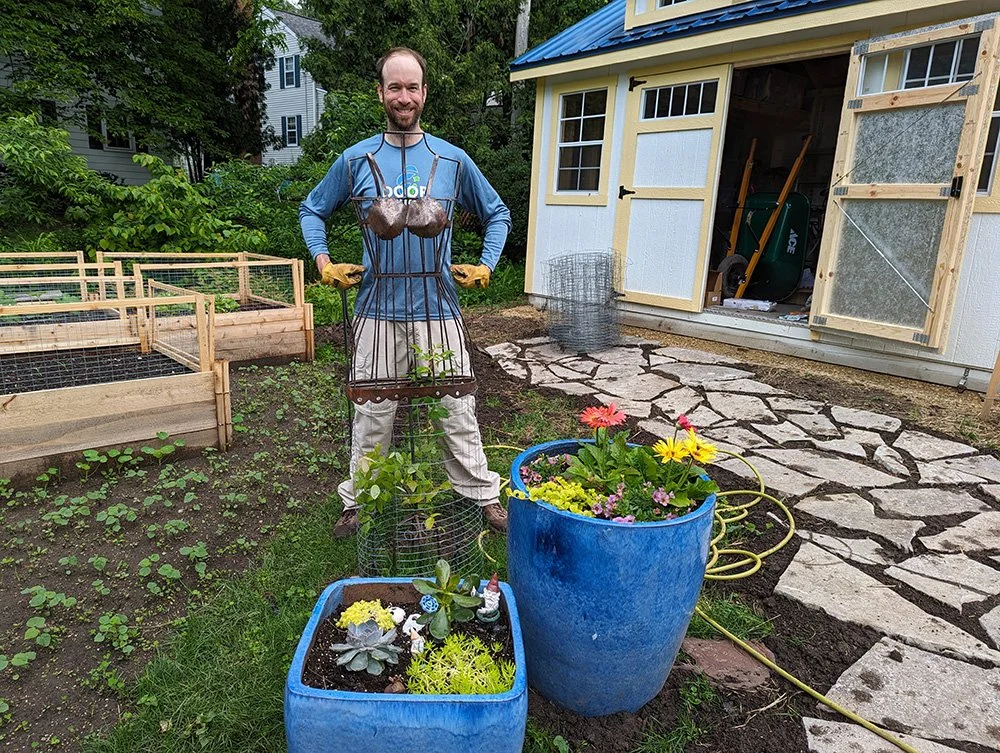Hope & Wonder
Our gnomes surveying the changes to the yard
Hope & Wonder
A Poetry Reading with Ada Limón
Two weeks ago Lucas and I were lucky to attend “Poetry and the Natural World,” a reading and Q&A with Ada Limón, the US Poet Laureate. Limón opened by asking who was attending a poetry reading for the first time. After the show of hands, she said she intended to make sure we wanted to attend more poetry readings in the future. She told us that she would read 13 poems, so we could either count up (if we were enjoying it), or count down (if we weren’t). (We definitely enjoyed it, though she fibbed—we got a bonus poem at the end.) It was impossible to choose a favorite.
Read a few of Ada Limón’s poems here
At one point Limón said, “When I don’t have hope, I still have wonder.” This statement followed me over the next several days. I echoed it in my inscription in Limón’s book You Are Here that I gave Lucas for our anniversary. (Because what’s more wondrous than love?) I thought about it over the weekend as I found more trash in our backyard, but also an overturned pillbug, wiggling its legs so fast it looked like an entirely different creature. Wonder came to mind again a few days later when a chipmunk had a little sit in the potted plant outside the sunroom door, inches from where I also sat, writing my notes for A Precautionary Tale.
Thankfully, A Precautionary Tale gives us an opportunity to both wonder and hope. I love how this story shows us we can change things. Not overnight, not easily, and perhaps not perfectly, but still in such astounding ways that hardly seemed possible at first.
Any fan of the movie Galaxy Quest remembers “Never give up. Never surrender.” (Or is it just me? I confess it’s a personal favorite.) “Without culture, no cheese” seems no less a rallying cry in the story of Mals, albeit a more nuanced one. There is the straightforward—the bacteria (culture) used to create the cheese—but, as Ackerman-Leist explains to us, there is also the unique flavor gained from each herd’s diet, the water used, and the methods involved.
It’s no secret that we need variety to survive. We require a balanced diet to keep our blood pumping freely, our muscles strong, and our bones sturdy. But we also need variety to thrive. The world offers plenty of it, but we seem driven to wipe it out in the name of efficiency and progress, too short-sighted to realize we are doing the opposite.
Ackerman-Leist writes: “There’s something about the history of farming. As soon as we start doing something well, we often start doing it so well that things turn out badly. The plow, the cow, and now the apple. Tool, animal, crop—when we capitalize too heavily on any one thing, we devalue other things that might be even more important to our communities than money.”
8 Reasons Not to Use Pesticides in Your Backyard
After yet another lawn company knocked on our door, I posted 8 Reasons Not to Use Pesticides in Your Backyard from the Bob Vila website in the neighborhood Facebook group. 23 people liked it, one thanked me for posting, and another neighbor said she seconded the post, adding that while companies will tell you they are targeting mosquitos, their pesticides kill all the other bugs too, including fireflies and butterflies.
It’s good to know that I’m definitely not alone in the neighborhood, being worried about pesticides. But what’s next? I’ll keep you posted.
But he goes on to show the farmers, gardeners, innkeepers, cheesemakers, and townspeople who know there’s another way. And they’re willing to fight for it. I’d like to spend the night at Hotel Greif and savor a dinner of local, organic food, follow my stay with a morning in Edith and Robert Bernhard’s garden smelling their herbs and witnessing their seed-saving efforts, then kick back with Ägidius and learning his bladeless scythe technique—how about you?
I hope you were as inspired by the passion of the people of Mals as I was. This book is going in my reread pile for whenever I need a reminder of the good people can do. What were your takeaways from the book? Is there a problem in your community that you would like to tackle? What are your concerns about addressing that problem?
Maybe that’s too much to think about right this second, or you haven’t had a chance to pick up the book. Tell me what gives you hope. And if not hope, what gives you a sense of wonder?
ONLINE BOOK CLUB MEETUP
If you are interested in an online book club meetup for June, please choose which times work best for you: June Book Club Form
June’s Book
Regenesis: Feeding the World Without Devouring the Planet by George Monbiot is our book for June, and it’s available in paperback, ebook, and audiobook.
Pair the Book with a Documentary
Check out Kiss the Ground (available to stream on Netflix, 1 hr 24 min) and let me know what you think in the comments on this or another blog post. Or let me know if you’d like to do a watch party!
This is a reenactment of the moment Lucas said he didn’t want a bench with a big butterfly on it because he didn’t “want the yard to be princessy.” He didn’t realize where he was standing. I came close to death laughing. (That’s a dress form he’s behind.)



